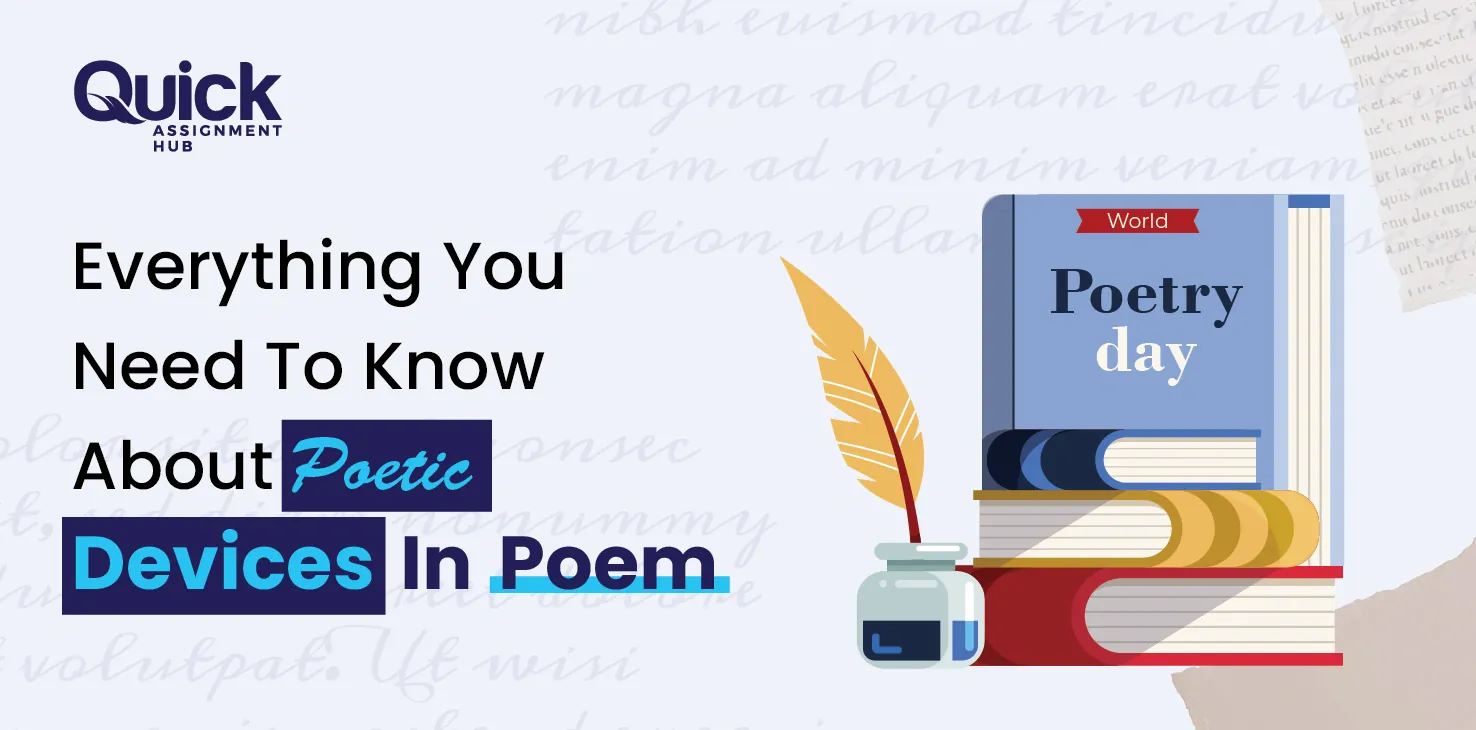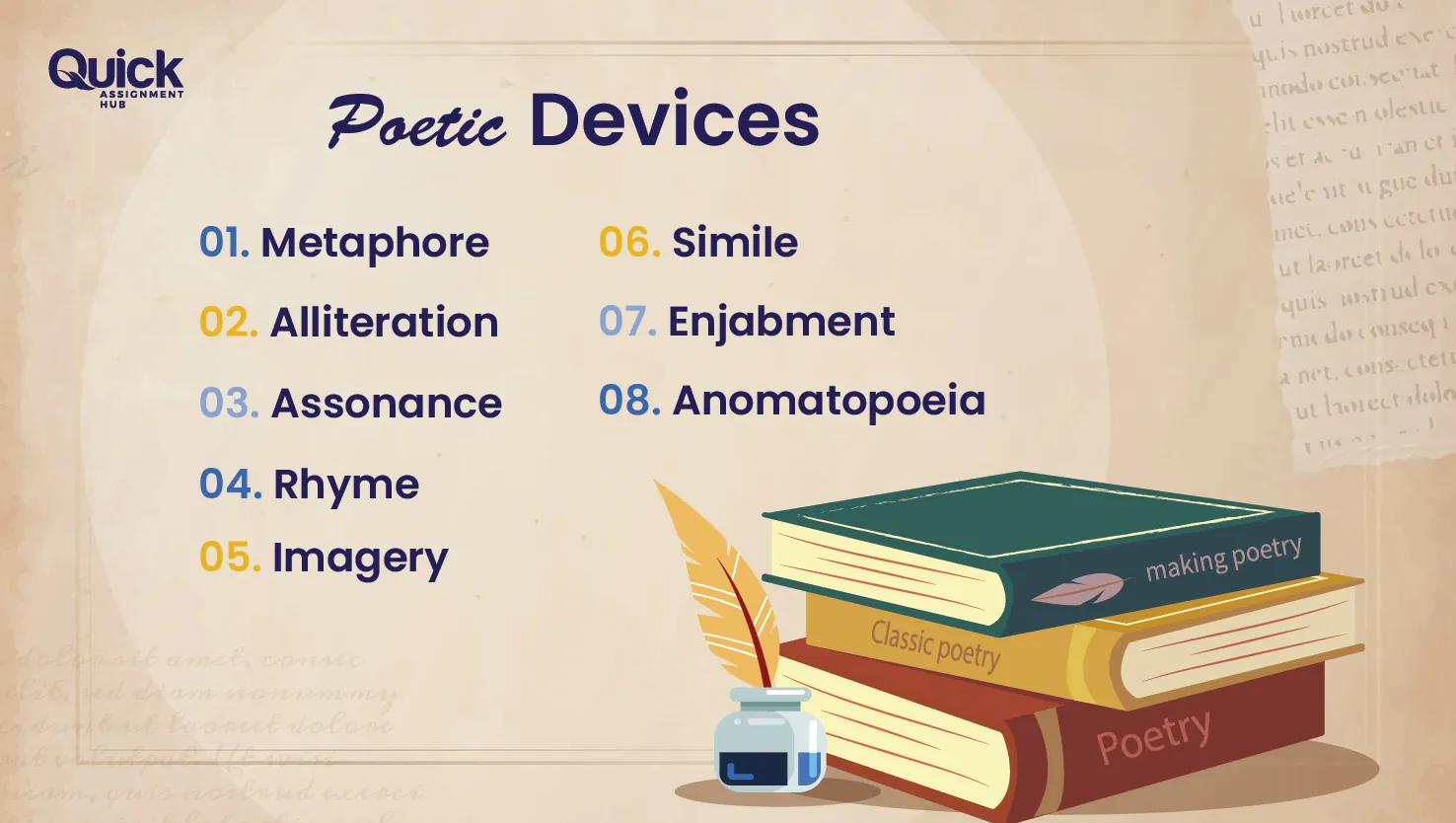
Poetry has never been words chained together; poetry is a form of art, a symphony of emotions, and an opening to a human life. Whether you are perusing the sonnets of Shakespeare, poems of Frost or the present-day free verse poetry, you must have observed that the poets resort to specific special methods to lend depth and meaning to their words.
Poetic devices in a poem are known as these techniques, which make poetry what it is and turn plain language into something quickly and memorably rhyming and making a difference. As a student, these tools are essential to learn not only to pass an examination and task but also to understand the beauty of every line. In this blog, we shall uncover what poetic devices are, various kinds of them, why they are essential and how you can learn to analyse them successfully in your studies.
First, the key question must be answered: What are poetic devices in poetry?
In their simplest terms, poetic devices in poem are methods or devices exercised by poets to improve their work. They enhance poetry through making poetry expressive, involving and challenging. Similar to the way a painter can use colours and brushes to convey physical images, poets can use words and devices to give the reader a picture in their mind.
Therefore, when you wonder what poetic devices are in a poem, think of them as instruments that make sound, rhythm and meaning thrive. They enable readers to experience their feelings, imagine situations and identify with the poet's purpose.
As examples of poetic devices, one may take the famous line of Robert Frost, wherein he says, 'The woods are lovely, dark and deep'. Instantly, the imagination is piqued by the repetition of the sounds and the description using imagery. That is how poetic devices turn the poem memorable.

With an understanding of what are poetic devices firmly in place, let us examine a list of these devices you are most likely to encounter in poetry. You will find that each device performs a distinct function in rendering a poem more powerful. Let's dive deep to list the poetic devices:
The reiteration of consonant sounds that begin words.
Example: Shore-side, she peddles seashells.
The recurrence of vowel sounds inside words.
Example: "Early to rise means seizing the worm."
A comparison that draws together two unlike things without employing the expressions "like" or "as."
Illustration: "Time steals everything."
An explicit comparison employing the words "like" or "as."
Example: Her smile burned with the brilliance of the sun.
Imputing human traits to inanimate objects.
Example: "The forest echoed a hush, as a breath of wind slithered among the trees."
Words that reproduce sounds.
Iluustion: Such as the words "buzz," "clang," or "whisper."
Using repetition of words or entire phrases establishes rhythm and highlights emphasis.
Exaggeration to emphasise.
Example: I have told you a million times.
Language that engages the senses through vivid description.
Using symbolism to impart greater meaning.
Example: A dove frequently stands as a symbol of peace.
Now that we have listed the poetic devices. We must remember that the list is far from exhaustive, but it does furnish you with a solid foundation. In classic and contemporary poetry alike, you will encounter many poetic devices in poems that showcase the remarkable strength they wield.
So why should you, as a student, devote time to analysing the poetic devices within a poem? In a nutshell, poetic devices enable you to grasp the poem's true meaning. Most poets eschew straightforward writing; they interlace layers of meaning, and the poetic devices reveal those layers. Here is a brief guide for grasping and scrutinising them:
Read the Poem Out Loud: More devices, such as rhyme, rhythm, and alliteration, are more readily grasped when spoken aloud.
Find Patterns: Identify repeated words, metaphors and symbolic language.
Attend to the Emotions: Ask yourself 'What emotions does the poem stir?' or 'In what way do poetic devices contribute?'
Determine the Poem's Purpose: Why did the poet choose a specific device? With the express purpose of setting a mood? To heighten a particular theme?
Take Notes: Always mark examples poetic devices in your study material.
For example, Robert Frost's line, "Miles to go before I sleep," in which repetition and metaphor jointly symbolise life's journey. A clear understanding of this deepens your appreciation and sharpens your academic skills.
While studying poetry can be captivating, encountering a writing assignment inevitably feels intimidating. How to articulate poetic devices clearly within a poetry essay. How do you furnish compelling illustrations of poetic devices in your paper? Well, Quick Assignment Hub can be your ideal collaborator. Thousands of students across the globe trust us for our excellent assignment writing service. Here are the reasons students around the world rely on us:
Expert Writers: We have experts with in-depth knowledge of English Literature, who craft outstanding assignments that examine poetic devices within a poem.
Customised Solutions: Every assignment is distinctive, so our team personalises each piece to meet your specifications and university requirements.
Plagiarism-Free Guarantee: We uphold originality as our foremost priority. All the assignments drafted by our experts are free from plagiarism.
Time-Saving: As you devote your efforts to studies and personal commitment, we ensure all your assignments are handed to you well before the deadline.
Affordability: We offer premium services that promise value at a student-friendly budget.
Poetry is far more than words; it hinges on rhythm, sound, and emotion. Acquainting yourself with poetic devices and reviewing an exhaustive list of them will make you more prepared to dissect literature and generate meaningful interpretations. Don't forget that every poet consciously employs rhetorical devices, and as students, your task is to uncover the meanings hiding behind them.
And if you get stuck when interpreting poetic devices within a poem or illustrating them within an assignment, Quick Assignment Hub is here to show you the way.
Next time a poem crosses your path, linger, contemplate, and ask yourself: Which poetic device renders that line unforgettable?